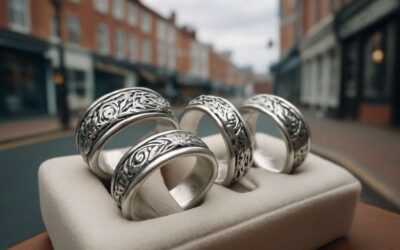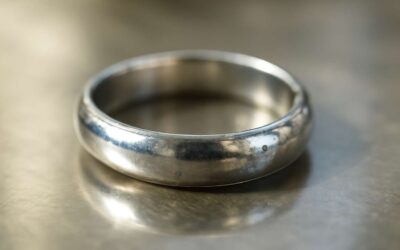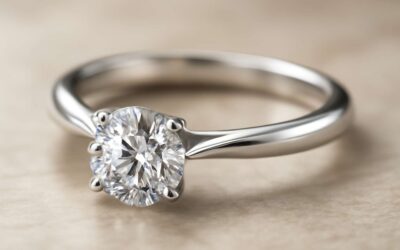Understanding Silver Tarnish
What Causes Tarnish on Silver Jewelry – Explains the chemical reactions and environmental factors that lead to tarnishing.
Silver, a metal treasured for its luminous quality and timeless elegance, holds a mystery that has fascinated artisans and jewellery lovers alike. Yet, beneath its shining surface lurks a common adversary—tarnish. Understanding what silver rings don’t tarnish involves delving into the intricate dance of chemical reactions and environmental influences that threaten its brilliance.
When silver is exposed to air with high levels of sulphur compounds, a subtle chemical transformation occurs. Silver reacts with sulphur, forming silver sulphide—a dull, blackish layer that mars its lustrous appearance. This process, known as tarnishing, is accelerated by factors such as humidity, pollution, and even skin oils. Interestingly, some silver alloys contain elements like platinum or palladium, which act as a shield, resisting tarnish and maintaining their radiant sheen. These special alloys exemplify what silver rings don’t tarnish, offering jewellery that stays luminous over time, even in challenging environments.
The Difference Between Sterling Silver and Pure Silver – Details how alloy content affects tarnish resistance.
Silver’s allure is undeniable, yet many wonder, “What silver rings don’t tarnish?” The answer lies in understanding the delicate balance between purity and alloy content. Pure silver, or fine silver, is composed of 99.9% silver but is surprisingly soft and prone to scratches and tarnish. It’s often used in jewellery but requires careful handling to preserve its luminous appearance.
In contrast, sterling silver—comprising 92.5% silver and 7.5% alloy metals—behaves differently. The additional metals tend to accelerate tarnishing, especially if they contain copper, which reacts more readily with sulphur compounds. However, certain silver alloys are specially formulated with elements like platinum or palladium, creating what silver rings don’t tarnish as quickly or at all! These precious metal additions act as a protective barrier, ensuring the jewellery maintains its radiant shine over time.
- Pure silver (fine silver) is often too delicate for everyday wear, but it’s the most authentic form of silver.
- Sterling silver is more durable but can tarnish faster due to its alloy content.
- Alloys containing platinum or palladium significantly improve tarnish resistance, making them ideal for rings that stay lustrous longer.
Understanding the difference between sterling silver and pure silver is crucial for anyone seeking what silver rings don’t tarnish. It’s a harmony of composition and craftsmanship that keeps these treasured pieces shining bright, even through the years of life’s everyday stories.
Types of Silver That Don’t Tarnish
Rhodium-Plated Silver Rings – Discusses how rhodium plating provides a tarnish-resistant surface.
At the intersection of beauty and resilience, certain types of silver shine with an unyielding luster—impervious to the tarnish that so often plagues traditional silver jewellery. Rhodium-plated silver rings exemplify this enduring resistance, thanks to a surface layer that acts as a formidable barrier against environmental elements. This platinum-like coating not only elevates the aesthetic appeal but also ensures that what silver rings don’t tarnish, at least not easily, maintaining their pristine condition over time.
The process of rhodium plating involves electrochemical deposition, creating a thin, durable shield that reflects light and prevents oxidation. For those who seek timeless elegance without constant maintenance, rhodium-plated silver rings offer a compelling solution. It’s this innovation that allows wearers to enjoy the allure of silver without the worry of tarnishing. If you’re wondering what silver rings don’t tarnish, this plating technique is among the most effective, offering both beauty and longevity in one exquisite package.
Silver Filled and Vermeil Jewelry – Explores jewelry with a thick layer of silver that resists tarnishing.
Amidst the shimmering allure of silver jewellery, a select few types defy the relentless march of tarnish, maintaining their luminous splendour over time. Silver filled and vermeil jewellery stand as testament to the artistry of modern craftsmanship, crafted to resist the dulling effects of oxidation. These pieces boast a thick layer of genuine silver, bonded meticulously to a base metal, creating a barrier that whispers resilience rather than frailty.
Silver filled jewellery, for instance, contains a substantial layer of sterling silver—often 25 times thicker than standard plated options—ensuring that what silver rings don’t tarnish remains a steadfast truth. Vermeil, with its generous coating of sterling silver over a gold base, offers another exquisite avenue, combining beauty with durability. The richness of vermeil’s surface grants an elegant resistance to environmental assault, making it a favoured choice among those seeking enduring splendour.
- Silver filled jewellery’s layered construction provides an impressive resistance to tarnishing, while maintaining affordability and aesthetic appeal.
- Vermeil’s thick silver coating over gold lends an unrivalled resistance to oxidation, elevating its status among tarnish-resistant silver rings.
These types of silver jewellery do not tarnish in the way traditional sterling silver might, thanks to their robust construction and protective coatings. Intriguingly, their resilience does not compromise their beauty; instead, it elevates their allure, offering a timeless elegance that endures through seasons and stories alike.
Sterling Silver with Nickel or Other Alloy Enhancements – Highlights specific alloy compositions that reduce tarnish tendencies.
When it comes to jewelry, durability matters. Surprisingly, some types of sterling silver are specially alloyed to resist tarnish better than traditional options. These silver alloys incorporate elements that slow down oxidation, allowing your silver rings to maintain their shine for longer periods. Understanding what silver rings don’t tarnish can help you make informed choices that save time and effort in polishing.
Alloy compositions play a significant role in tarnish resistance. Common enhancements include adding metals like platinum, palladium, or even nickel—though nickel is used cautiously due to allergies. These metals create a more stable surface, reducing the chemical reactions that cause tarnish. For those seeking hypoallergenic options, palladium is often preferred, offering both durability and tarnish resistance without skin irritation.
- Silver with palladium: An excellent choice for tarnish resistance and allergy sufferers.
- Silver with platinum: Offers robust durability and a natural resistance to tarnishing.
- Silver with other stabilising alloys: Custom mixes designed to extend the lustre of your silver rings.
While pure silver is valued for its beauty, it’s more prone to tarnishing. These specially alloyed sterling silver varieties, however, are engineered to keep your silver rings looking their best, longer. This ensures that what silver rings don’t tarnish is not just a myth but a practical reality for jewellery lovers. Choosing the right alloy can transform your experience with silver, making maintenance minimal and style enduring.
Coatings and Treatments That Prevent Tarnish
Rhodium Coating – Details the benefits and maintenance of rhodium-plated silver rings.
Among the myriad of enchantments that preserve the lustre of silver jewellery, rhodium coating stands as a true marvel. This platinum-group metal, renowned for its gleaming, mirror-like finish, forms a protective barrier that shields silver rings from the relentless assault of tarnish. When a silver ring is rhodium-plated, it transforms into a shimmering talisman, resistant not only to oxidation but also to fingerprints and minor scratches. The result? A radiant surface that maintains its splendour through the ages, requiring only gentle cleaning to preserve its brilliance.
While rhodium coating offers remarkable resistance to tarnish, proper maintenance ensures its magic endures. Regular polishing with a soft cloth and avoiding exposure to harsh chemicals help sustain the pristine appearance. For those seeking what silver rings don’t tarnish, rhodium-plated options provide an exquisite blend of beauty and durability. It’s a layer of armour that keeps the mystique alive, making each piece a timeless treasure in a world where tarnishing is often inevitable.
Protective Clear Coatings – Explains specialized lacquers and coatings designed to shield silver.
In the realm of silver jewellery, the quest for eternal brilliance often leads to innovative solutions that defy nature’s relentless push towards tarnish. Among these, protective clear coatings stand as a shining beacon of hope for those seeking what silver rings don’t tarnish. These specialised lacquers and treatments form an invisible shield, enveloping each piece in a transparent armour that preserves its pristine glow.
Crafted with advanced polymer technology, these coatings offer a formidable barrier against oxidation, fingerprints, and environmental pollutants. Unlike traditional polishing, which merely restores shine temporarily, these coatings provide long-lasting protection, ensuring your silver rings remain lustrous through years of wear and tear. For added assurance, some formulations include anti-tarnish agents that actively neutralise the chemical reactions responsible for tarnishing.
To enhance durability, many jewelers apply multiple layers, creating a resilient film that withstands everyday challenges. This innovation allows admirers of silver to indulge in their favourite adornments without the constant worry of tarnish. When selecting what silver rings don’t tarnish, seeking out pieces with a quality protective clear coating can transform each wear into a timeless experience, where beauty endures unblemished by the passage of time.
Anti-Tarnish Polishes and Sealants – Provides tips on using products to maintain tarnish-free silver jewelry.
Maintaining the allure of silver jewellery can be a challenge, but the right coatings and treatments make a significant difference. Anti-tarnish polishes and sealants are a popular choice for those wondering what silver rings don’t tarnish. These products create a protective barrier that inhibits the chemical reactions responsible for tarnishing, keeping your jewellery pristine longer.
When applying anti-tarnish polish, a thin layer is enough to provide lasting protection. It’s essential to follow the manufacturer’s instructions carefully to avoid over-application, which can lead to residue buildup. Sealants, often available in spray or liquid form, form an invisible shield that resists moisture, sulphur compounds, and pollutants—common culprits behind tarnish formation.
For optimal results, consider the following tips:
- Clean your silver thoroughly before applying any protective treatment.
- Apply sealants in a well-ventilated area and allow adequate drying time.
- Reapply treatments periodically, especially if the jewellery is worn daily.
Using quality products designed to prevent tarnish can transform your experience with silver jewellery. It’s a simple yet effective way to preserve the beauty of what silver rings don’t tarnish, ensuring they remain lustrous and stunning for years to come. Proper application and regular maintenance are key to keeping your valued pieces looking their best without constant polishing.
Materials and Jewelry Brands That Offer Tarnish-Resistant Silver Rings
Reputable Brands Known for Tarnish-Free Silver – Lists brands offering high-quality, tarnish-resistant silver rings.
Certain brands have earned a reputation for producing silver rings that don’t tarnish, thanks to innovative alloying techniques and treatment processes. Reputable companies such as Tiffany & Co., Pandora, and James Avery are known for their high-quality, tarnish-resistant silver rings. These brands often incorporate special alloy blends or apply advanced coatings to enhance durability and maintain their shine over time.
For those seeking long-lasting jewellery, choosing a brand with a proven track record in creating tarnish-free silver is essential. Many of these brands use sterling silver enhanced with nickel or other alloy enhancements that significantly reduce tarnishing tendencies. Additionally, some manufacturers utilise rhodium plating or protective clear coatings that form a robust barrier against environmental factors.
While no silver is entirely immune to tarnish, these brands demonstrate that with proper materials and craftsmanship, you can enjoy beautiful, tarnish-resistant silver rings for years to come. Whether you prefer classic styles or modern designs, exploring these trusted names will help you find what silver rings don’t tarnish, truly elevating your jewellery collection.
Custom and Designer Silver Rings with Special Finishes – Highlights bespoke and designer options designed to resist tarnishing.
For those who seek silver rings that defy the relentless march of tarnish, the realm of custom and designer jewellery offers a treasure trove of innovative finishes and specialised materials. These bespoke pieces are crafted with precision, employing advanced surface treatments that elevate their resistance to environmental factors. The allure of a silver ring that maintains its pristine shine over time is no longer a distant dream but a tangible reality through these artisanal techniques.
Many luxury designers incorporate unique finishes such as matte coatings, brushed textures, or high-polish layers that not only accentuate the beauty of each piece but also act as a shield against tarnishing. Among the most sought-after options are rhodium-plated silver rings, which boast a luminous, durable surface. Rhodium’s reflective qualities create an almost mirror-like effect while providing an additional barrier that significantly reduces tarnish formation. This process is especially popular in custom designs, where intricate detailing is preserved against corrosion and discolouration.
Furthermore, some artisans utilise protective clear coatings—akin to an invisible armour—that safeguard the silver beneath. These lacquers form a resilient layer, ensuring what silver rings don’t tarnish remains a steadfast truth. A curated list of bespoke options might include:
- Rhodium-coated silver rings for a mirror-like finish and enhanced tarnish resistance.
- Silver vermeil with thick layers of fine silver, offering both beauty and durability.
- Jewellery with specialised anti-tarnish sealants applied during crafting, providing long-lasting protection.
In the world of designer silver, each piece becomes a testament to craftsmanship and technological innovation—an enduring symbol of elegance that remains luminous, no matter the passage of time. These custom finishes and alloy combinations redefine what silver rings don’t tarnish, transforming them into heirlooms crafted to enchant for generations.
Best Practices for Maintaining Silver Rings Without Tarnish
Proper Storage Tips – Advice on storing silver jewelry to prevent tarnish.
Maintaining the pristine allure of silver rings without tarnish requires more than just occasional cleaning; it demands a strategic approach to storage that minimises environmental exposure. Proper storage acts as a silent guardian, shielding your cherished pieces from the pervasive effects of sulphur compounds, humidity, and airborne pollutants—culprits behind the elusive tarnishing process. When kept in a controlled environment, silver rings are less vulnerable to the subtle, yet relentless, chemical reactions that erode their luster.
One of the most effective practices involves storing silver rings in anti-tarnish pouches or specialised jewellery boxes lined with tarnish-resistant fabric. These storage solutions create a barrier, preventing oxidation and reducing contact with elements that accelerate tarnishing. Additionally, storing silver jewellery separately from other metals avoids unwanted reactions that could compromise their surface integrity. For those seeking an extra layer of protection, using silica gel packets within storage containers can absorb excess moisture, further mitigating tarnish formation. Truly, thoughtful storage is an often-overlooked yet vital component in preserving what silver rings don’t tarnish, ensuring their brilliance endures through time and fashion trends alike.
Cleaning and Polishing Techniques – How to clean and maintain tarnish-resistant silver rings.
Silver, a metal steeped in mystique and allure, has long captivated those who seek its luminous charm. Yet, beneath its shimmering surface lies a vulnerability — tarnish, that ghostly film born from chemical reactions with sulphur compounds lurking in the air. But what silver rings don’t tarnish? The secret lies not solely in their material but in the careful ritual of upkeep and maintenance. To preserve their unblemished brilliance, cleaning and polishing techniques must be employed with reverence and precision.
Gentle cleaning with a soft cloth remains the cornerstone of tarnish prevention. For rings that boast enhanced resistance, opt for a silver polish specifically formulated for tarnish-resistant silver rings. These products create a protective barrier, preventing oxidation and maintaining the lustrous sheen over time. When polishing, use a circular motion to evenly distribute the protective layer without abrading the surface. For a more mystical touch, some prefer to use natural remedies like a paste of baking soda and water, gently buffing away tarnish while preserving the integrity of the silver.
In the realm of maintenance, patience and consistency are key. Regularly inspecting your silver rings ensures early detection of tarnish, allowing for swift intervention. For those who desire a permanent shield against the shadows of tarnish, consider coatings such as rhodium plating or specialised sealants. These thin veils act as enchanted armour, safeguarding the silver beneath from the subtle decay that so often plagues lesser metals. Truly, the art of caring for tarnish-resistant silver rings is a dance of devotion — a quiet ritual that sustains their spectral beauty for generations to come.
Items to Avoid When Wearing Silver Jewelry – Lists substances and environments that can still affect tarnish-resistant silver.
While some silver rings seem to glow with an eternal radiance, they’re not invincible. In fact, even tarnish-resistant silver isn’t immune to certain substances and environments. To truly understand what silver rings don’t tarnish, it’s essential to recognise what can still compromise their lustrous veneer.
Substances like household chemicals, chlorinated water, and cosmetics are notorious culprits. Exposure to these harsh agents can eat away at the protective layers, despite the ring’s tarnish-resistant coating. Similarly, environments with high humidity, salty air, or direct sunlight can accelerate oxidation, dulling that once-pristine shine.
For those who wear their silver jewellery daily, it’s wise to avoid:
- Perfumes and hairsprays — because aerosols are not friends of silver
- Cleaning agents with bleach or ammonia — they’re practically kryptonite to silver’s integrity
- Prolonged contact with water, especially chlorinated or salty seawater, which can undermine even the best tarnish-resistant finishes
Additionally, storing your silver rings in non-airtight environments or in humid conditions can foster tarnish. It’s always best to keep them in anti-tarnish pouches or jewellery boxes with silica gel packets — because prevention is better than polishing away tarnish later. Understanding what silver rings don’t tarnish is half the battle; the other half is knowing what to avoid to keep that luminous charm intact for ages to come.



0 Comments